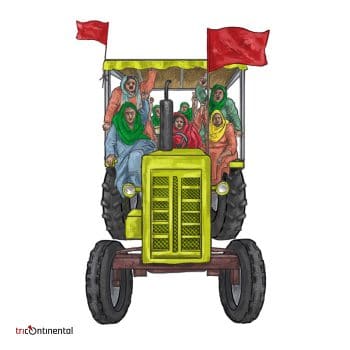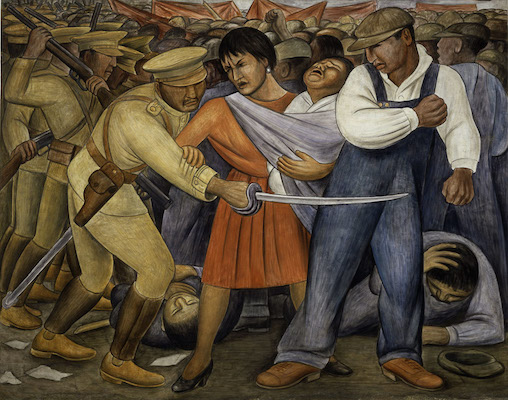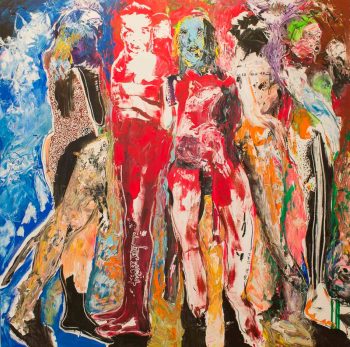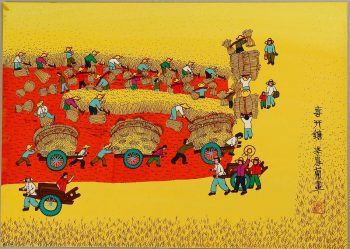Dear friends,
Greetings from the desk of the Tricontinental: Institute for Social Research.
 On 26 January, India’s Republic Day, thousands of farmers and agricultural workers will drive their tractors and walk into the heart of the capital, New Delhi, to bring their fight to the doors of the government. For two months, these farmers and agricultural workers have been part of a nation-wide revolt against a government policy that seeks to deliver all the gains of their labour to the large corporate houses, whose profits have ballooned during this pandemic. Despite the cold weather and the pandemic, the farmers and agricultural workers have created a socialistic culture in their encampments with community kitchens and laundries, distribution points providing free essentials, recreational activities and places for discussion. They are quite clear that they want three laws repealed and are demanding their right to a greater share of their harvest be established.
On 26 January, India’s Republic Day, thousands of farmers and agricultural workers will drive their tractors and walk into the heart of the capital, New Delhi, to bring their fight to the doors of the government. For two months, these farmers and agricultural workers have been part of a nation-wide revolt against a government policy that seeks to deliver all the gains of their labour to the large corporate houses, whose profits have ballooned during this pandemic. Despite the cold weather and the pandemic, the farmers and agricultural workers have created a socialistic culture in their encampments with community kitchens and laundries, distribution points providing free essentials, recreational activities and places for discussion. They are quite clear that they want three laws repealed and are demanding their right to a greater share of their harvest be established.
The three laws that the Indian government led by Prime Minister Narendra Modi pushed would–the farmers say–eviscerate their bargaining power over the national and global commodity (food) chain. Without any state protection–including price supports and a public distribution system for food–the farmers and agricultural workers would be forced to pay prices set by the large corporate houses. The government’s laws ask farmers and agricultural workers to surrender to the power of the corporations, a maximalist position being imposed on them that makes negotiation impossible.
The Indian Supreme Court entered the impasse with an order to create a committee to evaluate the situation, while the Chief Justice made a remark that the farmers–particularly women and the elderly–should vacate their protest sites. The farmers and agricultural workers rightly felt outraged by the disrespectful remarks of the Chief Justice (Satarupa Chakraborty, a researcher at Tricontinental: Institute for Social Research, has refuted those statements). Women are equally farmers and agricultural workers, and drivers of the farmer’s revolt–a fact demonstrated by the mass attendance on Mahila Kisan Diwas (Women Farmers’ Day) celebrated on 18 January at all the encampment sites. ‘When women farmers will speak’, their banner declared, ‘the borders of Delhi will shake’. ‘Women are going to be the worst sufferers of the new farm laws. Though very much involved in agriculture, they do not have decision-making powers. The changes in the Essential Commodities Act [for example] will create a lack of food and women will face the brunt of it’, says Mariam Dhawale, general secretary of the All-India Democratic Women’s Association (AIDWA).
Furthermore, the committee created by the courts is made up of well-known people who have taken a public position in support of the government’s laws. None of the leaders of the farmers and the agricultural workers organisations are on this committee, which means–once more–that laws and orders will be made for them rather than by them or with their consultation.
This recent attack on Indian farmers and agricultural workers is part of a longer series of assaults. On 10 January, P. Sainath, the founder of the People’s Archive for Rural India and a senior fellow at Tricontinental: Institute for Social Research, addressed a meeting in Chandigarh at which he talked about the broader context. ‘It is not only about the laws, which they have to take back’, Sainath said. ‘This struggle is not only about Punjab and Haryana; it has gone beyond this. What do we want, community or corporate-led agriculture? The farmers are directly confronting the corporate model. India now is a corporate-led state, with socio-religious fundamentalism and market fundamentalism ruling our lives. This protest is in defense of democracy; we are reclaiming the republic’.
The protests come at a time when there is great international concern about the situation of hunger and food production from multilateral agencies. Ismahane Elouafi, the chief scientist at the UN Food and Agriculture Organisation (FAO), recently told Reuters that farmers and poor urban residents have taken the burden of this pandemic. ‘Cut off from markets and with a plunge in customer demand, farmers struggled to sell their produce while informal workers in urban areas, living hand to mouth, found themselves jobless as lockdowns were imposed’, she said. Elouafi could very well have been talking about India, where the farmers and the urban poor are equally struggling to make ends meet in just this manner. Elouafi points to a general crisis in the international food system that requires serious consideration at the global level, but also within countries. One of every five calories that people eat has crossed an international border, an increase of 50% over the past four decades. This means that international food trade has dramatically increased, although four out of five calories are still eaten within national boundaries. Proper international and national policies for food production are necessary at both the global and domestic scales. But, over the past several decades, there has been no real international debate over these issues, largely because of the domination of a set of large food corporations in setting the terms of policy.
The logic of profit has driven the food system to privilege the production of goods that can be relatively cheaply produced and easily transported. The best example of this is in cereal production, where the industry drives ‘cheap calorie’ grains (such as rice, maize, and wheat) over nutritious crops (such as African Bambara groundnuts, fonio, and quinoa) because the former are easier to grow at a vast scale and are easier to transport. The ‘calories race’ that this process engenders enables a few countries to dominate food production and make the rest of the world net food importers.
There are several downsides to this: the growth of these cheap calories relies upon the vast use of freshwater, high greenhouse gas emissions due to transportation (30% of all such emissions), clear-cutting of complex ecosystems, and a state-subsidy regime of $601 billion in Europe and North America (governments in the Global South, meanwhile, are forced to cut their subsidies). This entire food production system goes against both the labour of the farmers and the agricultural workers but also against good health and sustainability practices, since excess consumption of these simple carbohydrates creates negative health effects.
There is no lag in food production. There is enough food produced. But the food that is produced is not necessarily the best kind of food with the nutritional diversity required for a healthy diet; and even this food does not go to those who simply do not have the income to eat. Hunger rates had risen dramatically before the pandemic, and they are now skyrocketing; amongst those who are hungry are the farmers and agricultural workers who grow the food but cannot afford to eat it.
A recent study published in The Lancet has shocking news about the levels of hunger amongst young people. Researchers studied the height and weight of 65 million children and adolescents around the world before the pandemic and found an average 20-centimetre height gap due to the lack of healthy nutrition. The World Food Programme says that, during the pandemic, 320 million children are missing out on food that is normally provided at school. UNICEF notes that, as a result of this, an additional 6.7 million children under the age of five are at risk of wasting. The meagre income support provided in most countries will not stem this tide. The reduction of food coming into homes has a catastrophic impact along gender lines, since mothers typically eat the least or forgo food to ensure that everyone else in the family eats.
Innovations in public delivery of food are essential. In 1988, China’s government set up the ‘vegetable basket programme’, in which mayors have to account every two years for the availability of affordable and safe non-grain foods (fresh produce is key here). Hinterlands of cities and towns had to protect their farmland so that non-grain foods could be grown nearby. For instance, with a population of eight million, Nanjing was 90% self-sufficient in green vegetables in 2012. The existence of the ‘vegetable basket programme’ enabled China’s cities and towns to ensure that the population continued to eat fresh produce during the COVID-19 lockdown. Such programmes need to be developed in other countries, where the food industry is driven by profit through the sale of cheap calories; these cheap calories have a very expensive, negative impact on society.
The Indian farmers’ revolt is certainly their fight to repeal the three anti-farmer bills. But their fight is for much more than that. It is a fight for the agricultural workers–one fourth of them around the world are migrants–who have very little security of tenure and earn extraordinarily low incomes. It is also the fight for humanity, a fight for a rational food policy that would benefit both the farmers and those who must eat.
The protest sites that ring Delhi–and from where the farmer and agricultural workers will move into the city on 26 January–are filled with joy and culture. Poets have come to recite their verse to the people. One of Punjab’s most famous poets, Surjit Patar, wrote a lyrical poem before he decided to return an award (Padma Shri) he received from the government. His poem rings across the landscape, capturing the width of the protest and its music:
This is a festival.
As far as I can see
Beyond what I can see
There are people gathered.
This is a festival,
Of people and land, trees, water, and air.
It includes our laughter, our tears, our songs.
And you don’t know who are part of it.
The poem describes the interaction of a young girl with farmers. The girl says that when the farmers leave there will be no joy in the world. ‘What shall we do then?’, she asks, and as the farmers weep, she says, ‘my wish is that you win this fight for truth’.
It is our wish too.
Warmly,
Vijay.




